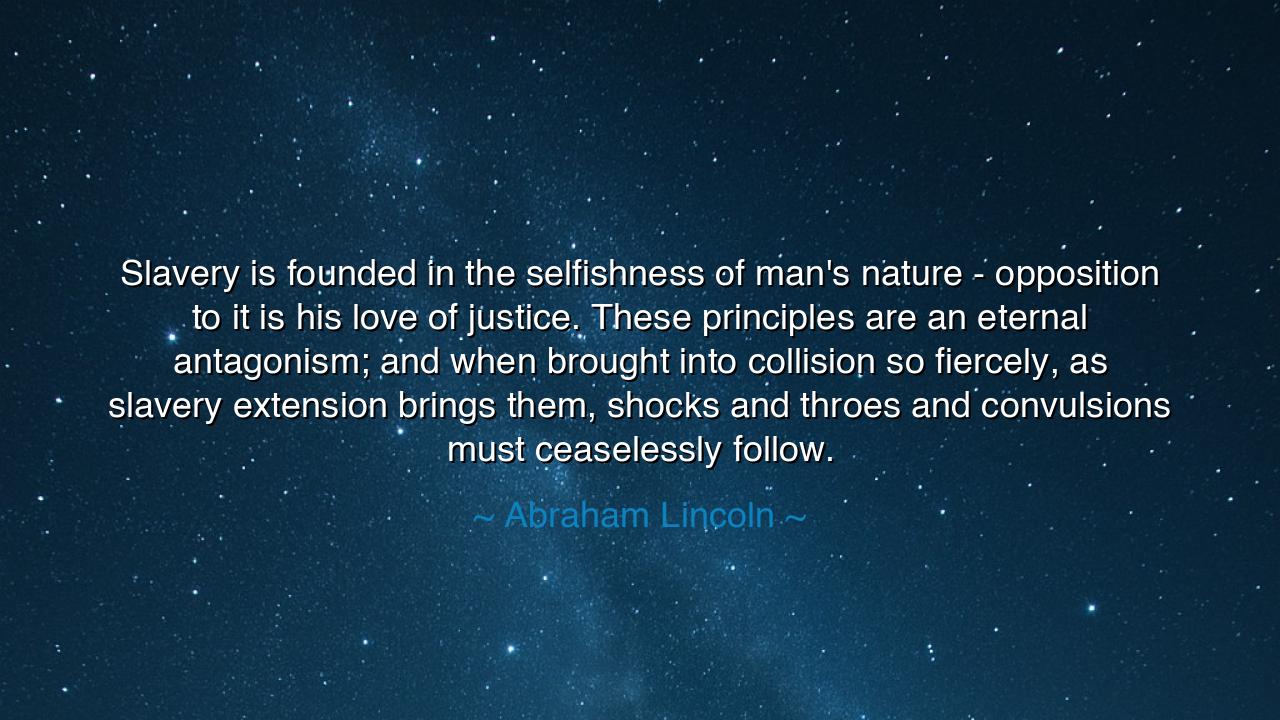
Slavery is founded in the selfishness of man's nature -
Slavery is founded in the selfishness of man's nature - opposition to it is his love of justice. These principles are an eternal antagonism; and when brought into collision so fiercely, as slavery extension brings them, shocks and throes and convulsions must ceaselessly follow.






Hear now the words of Abraham Lincoln, who stood in the storm of his age and beheld the eternal battle that lies within the heart of man. He declared: “Slavery is founded in the selfishness of man's nature—opposition to it is his love of justice. These principles are an eternal antagonism; and when brought into collision so fiercely, as slavery extension brings them, shocks and throes and convulsions must ceaselessly follow.” In this utterance, the great emancipator unmasked the truth that the conflict of his time was not merely about laws and lands, but about the very soul of humanity. For within every heart dwell two spirits—the grasping hand of selfishness and the uplifting flame of justice—and when they collide, the earth itself trembles.
From the dawn of ages, mankind has wrestled with these two principles. The one seeks to dominate, to bind others in chains for profit, comfort, or power. The other rises to defend the weak, to proclaim liberty, and to establish equity. Thus, the struggle is not new, but woven into the fabric of human history. What Lincoln saw was the timelessness of this war, its roots running deeper than politics or property, down into the dark soil of man’s fallen nature and the shining heights of his noblest aspirations.
Consider the tale of Spartacus, the gladiator who rose in defiance against Rome. His revolt was not born of greed but of the yearning for freedom—for himself and for his brethren bound in chains. Though crushed by the might of legions, his name endures because it speaks to that love of justice which cannot be silenced by swords or empires. In the same way, Lincoln knew that even if the slave power reigned for a season, it could not endure forever, for it stood against the unyielding tide of righteousness.
The language of Lincoln is prophetic: “eternal antagonism.” He does not promise an easy peace, nor does he flatter humanity with illusions. He tells us plainly that when these two forces meet—when the cruel hand of bondage presses against the yearning of the oppressed—there will be no quiet resolution. There will be “shocks and throes and convulsions.” Like the earth quaking before a volcanic eruption, society will be shaken when injustice grows too vast to ignore. The Civil War itself became the fiery furnace in which this truth was tested, and out of its agony came the breaking of chains for millions.
And yet, though the chains of slavery in its old form have been broken, Lincoln’s words still echo for us today. For selfishness still whispers in the human heart, finding new forms of oppression, new disguises for exploitation. Wherever one man uses another for gain, wherever dignity is trampled for profit, the ancient antagonism stirs again. And wherever there are men and women of courage who rise to defend what is right, there too burns the flame of justice. The battle did not end at Appomattox—it continues in every generation.
What then shall we learn from this? That we must not expect harmony where oppression exists, nor deceive ourselves that peace can be built upon chains. True peace comes only when justice triumphs over selfishness, when the weak are lifted up and the strong use their power not to bind but to bless. Lincoln’s wisdom calls us to vigilance, for the moment we grow complacent, the darker principle rises once more to enslave in new forms.
Therefore, let each one of us act. In our homes, let us teach our children the value of fairness. In our work, let us refuse to profit at the expense of the helpless. In our nations, let us guard against laws or customs that would enslave men in poverty, prejudice, or fear. Small acts of justice, multiplied by many hands, become stronger than the grip of selfishness.
And so, O listener, carry these words as a warning and as a charge. The eternal antagonism will not cease until the end of time. But take heart—for though selfishness is ancient, so too is the human yearning for freedom. And if you choose to side with justice, you join a noble lineage stretching from Spartacus to Lincoln, from the nameless rebel to the immortal liberator. Stand firm, for though the struggle brings “shocks and throes,” it also brings the birth of a freer and nobler world.






AAdministratorAdministrator
Welcome, honored guests. Please leave a comment, we will respond soon